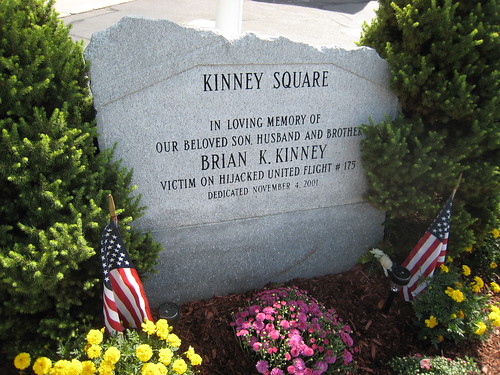Lowell Week in Review: September 11, 2016
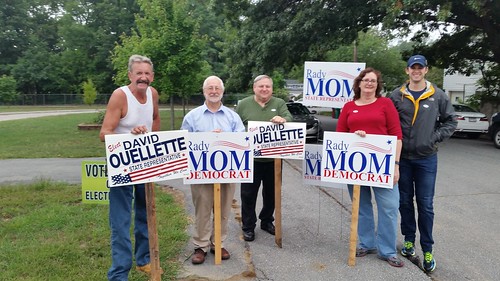
Outside the Daley School on Primary Election Day
Primary Election
In case you missed it, the state primary election took place this past Thursday. 4,896 of the 62,453 registered voters in Lowell showed up. That’s 7.84 percent. The major contested race in Lowell was in the 18th Middlesex State Representative District. Rady Mom was renominated with 1,072 votes; Dave Ouellette finished second with 611; and Cheth Khim finished third with 402. Rady will face Republican Kamara Kay in the November 8, 2016 general election.
I voted at the Daley School at 730 am. There was one other person voting in my precinct when I was there. He was on the voting rolls as “inactive” so he had to sign some kind of document to be able to vote. Back in July, I received a postcard saying I was deemed an inactive voter. I believe that was because the city did not properly receive my city census form earlier in the year (even though I answered the form and mailed it). In July, I signed and returned the warning postcard and was restored to active voter status.
If this happened to me, I suspect it happened to many others. Some may have returned that warning postcard and a few more may have discovered their inactive status by voting last Thursday. But most will remain inactive – I wonder how many inactive voters there are in Lowell?
The process for allowing an inactive voter who shows up on election day to vote is fairly simple, but it still takes time. That additional time didn’t mean much in an election in which fewer than 5,000 people voted, but when 30,000+ people arrive at the polls on November 8, 2016, it could lead to long, frustrating waits.
If you are not sure of your voting status, Secretary of State Bill Galvin has a useful tool on his website that allows you to check that. It also tells you where to vote and, once the ballot is set, to see a sample of it.
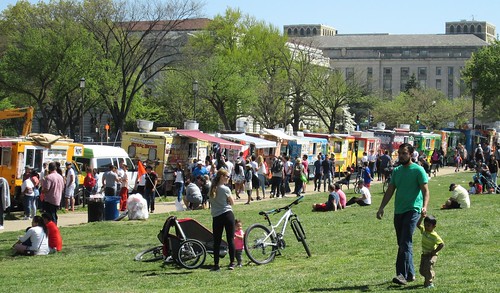
Food trucks on the National Mall, Washington DC
Food Truck Ordinance
This coming Tuesday, the city council will hold a public hearing on a proposed food truck ordinance. The new regulation would require “mobile food vendors” to obtain a license from the city council and an annual permit from the Department of Developmental Services. Mobile vendors may operate year-round, but only from 6 a.m. until 2 a.m.
The ordinance also restricts mobile food vendors from the Central Business District which is roughly a box formed by Market St – Prescott St – Kearney Sq – Bridge St – French St – Lucy Larcom Park – and Dutton (to Market). The map below shows the exact area.
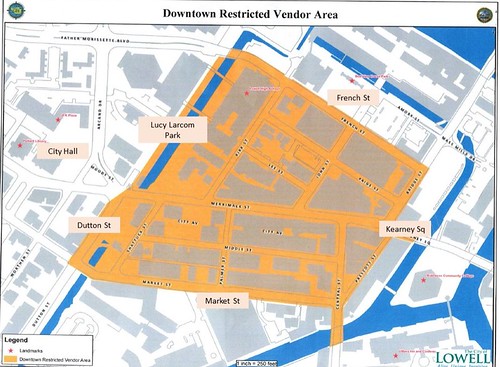
Food trucks banned from yellow area
In his cover memo to city councilors, City Manager Murphy explains the rationale for this restriction:
Just as important as it is to support new mobile food vendors in the City, it’s equally important that existing businesses are not hurt by this ordinance. So as not to compete with downtown restaurant establishments and considering the demand for on street parking spaces, the proposed ordinance prohibits new mobile food vendors from operating in the central business district.
National Park Tour Bus Parking
A major choke point in the Hamilton Canal District development has been the acquisition by the city of the Dutton Street parking lot now owned and used by Lowell National Historical Park. Until that land transfer is resolved, the city can’t start building the big 900-space parking garage behind Market Mills. One of the holdups of the parking lot transfer has been what to do with tour buses coming to the park.
A possible solution was found when the city identified a number of small lots between the Gallagher Terminal and the Lowell Connector which would be adequate for the tour bus parking. After months of sometimes contentious negotiations with Lowell Regional Transit Authority, which controlled these lots, an agreement was reached. That deal will be consummated this Tuesday, with a council vote to accept the transfer of these parcels on YMCA Drive from the MBTA (which officially owns them) to the city which will pay $78,470 for the land. The vote should be a non-controversial one and may get little attention, but it is a big deal for the future of the Hamilton Canal District and of the city.

Panhandling Ordinance
The council will receive a long-awaited report on the city manager’s proposed strategy on panhandling. The centerpiece of the strategy is a public education campaign called “Use Your Change for Change” that encourages people to give money to local charities rather than to individual panhandlers. To facilitate donations, the city will establish “donation stations” which initially will be refurbished parking meters which were retained by the city after being replaced by parking kiosks several years ago. The parking kiosks themselves will be reprogramed to accept donations in the same way that you now pay for parking. (The reprograming will require a software change that will take some time to implement).
A further part of the strategy is to launch a Continuum of Care page on the city’s website. This would allow individuals who wish to donate larger sums of money to do so online, and would also provide information on and links to drug assistance, homeless assistance, food pantries, and other resources.
Another phase of the strategy is to enhance and better connect with the Lowell Police Department’s Community Opioid Outreach Program (CO-OP) which emphasizes treatment and education when responding to overdoses. This approach, rather than a pure arrest and prosecute strategy aimed at addicts, has the best chance of breaking the cycle of addiction. Also, the Lowell Career Center will better assist homeless persons in finding employment, a grant-funded effort that is already underway.
This approach makes a lot of sense. The law – namely the First Amendment to the U.S. Constitution – prohibits almost any type of ordinance that would ban or restrict panhandling. The city’s previous effort in that direction was pointedly rejected by the judge who heard the matter. In this new approach, freedom of speech is used to persuade people to donate money to organizations rather than individuals on the street, while at the same time providing the assistance needed to help those individuals address whatever it is that leads them to panhandling in the first place. People can still ask for money, but if no one gives it to them directly, they may stop doing it.
Speaking of thoughtful approaches to social problems, back on September 2, 2016, the Globe had an important story on affordable housing. In the story, “In Greater Boston, a lopsided geography of affordable housing,” reporter David Scharfenberg wrote that the latest academic research shows that the best way to break the cycle of intergenerational poverty is to allow low-income families to use housing subsidies to move from struggling city neighborhoods to thriving suburban communities.
Despite the proven success of this approach, it happens rarely. The article blames a mixture of factors for that. At the top of the list is suburban resistance to affordable housing. But another factor is advocates for affordable housing themselves and the bankers and developers who work with them. They find it easier to build affordable housing in cities that already, rather than fight the development-threatening battles to build such places in suburbia. Even when some affordable housing is built in suburbia, factors like a lack of public transportation and the hesitancy of qualifying occupants to relocate from familiar neighborhoods and cities to an unknown community combine to suppress the construction of more housing in suburbia.
The article provides a great case-study of this phenomenon by focusing on efforts in Newton, Massachusetts, to increase its scarce inventory of affordable housing and the fierce resistance that arises against each attempt. As one housing advocate said, “For many people, their liberalism stops at end of their driveways.”
This article should give support to city officials, like some in Lowell, who decry the near monopoly the city has on social services. Many will find this to be an awkward topic to discuss, but it bears further discussion, not just within Lowell but also at the state level.
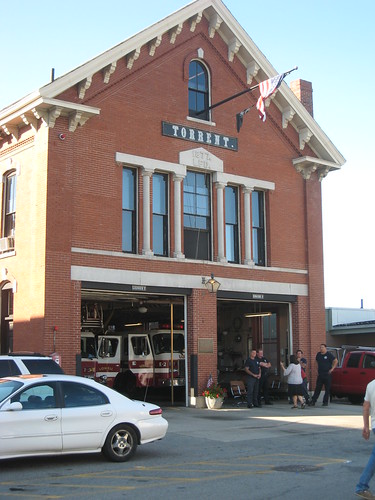
Branch St Fire Station, est 1877
Fire Department Study
Also this week, Councilors received the findings from a year-long study of the Lowell Fire Department which offers recommendations on “service, operational efficiency, organizational structure, utilization of alternative vehicles, and technology.” In his cover letter, City Manager Murphy recommends the report be referred to the council’s Public Safety Subcommittee for a detailed presentation.
The 48-page report is contained in the online agenda for this week’s council meeting. Here are some of the highlights: The current collective bargaining agreement contains much that is outdated (although that is being addressed in current negotiations). Payment of overtime, granting of vacation time, and staffing during emergencies, are three items that should get more attention. While current management systems are effective, there should be more reliance on data as a management tool. Too many people report directly to the Fire Chief; the department should be reorganized with one Deputy Chief in charge of operations and another of support services. Current level of overtime is “quite reasonable” and should remain so with recent increases in staffing. Maintaining, renovating, and modernizing all city buildings, including fire stations, has been a challenge for decades. The city should also have a regular schedule of replacing fire vehicles and of upgrading individual protective equipment.
The report observes that due to relatively large amounts of vacation time contractually granted, plus personal leave, extended injury leave, and some other factors, only 75% of fire fighters work their normally assigned shift. This requires overtime expenditures and the closing of one vehicle/station per shift. The report also warns that when the Federal SAFER grant, which funds some of the recently hired fire fighters, expires, the city will have to substantially increase the fire department’s budget to retain those additional personnel hired through the grant.
The report has some other recommendations about equipment replacement, response times, and the adoption of a new type of unit, a “rescue squad” of the type now in use in Cambridge. This would be a two-person unit operating a pick-up truck sized vehicle that would respond to non-fire incidents such as medical calls and automobile accidents which the report suggests would be a more efficient use of vehicles and personnel than sending larger trucks to these types of events.
Historically, the Lowell Fire Department has been a progressive and innovative organization in accomplishing its mission of safeguarding the city from fire and other life and health-threatening situations. Through the years, the most controversial topics have been labor-related. While those issues have not dominated the news in recent years, this report makes it clear that personnel issues continue to exist and have an impact on the department’s ability to conduct its mission. The report further states that some of those issues are currently being addressed in the negotiation process. The fact that those of us outside of that process know little about what is going on is a good sign. (If there was a stalemate, we’d be hearing more about it). While the city manager and the fire fighter’s union are conducting those negotiations, the council has a big part to play, primarily in long-term funding decisions for personnel and equipment, so the upcoming Public Safety Subcommittee meeting that takes up this report will be an important one.
Irish History Conference
Congratulations to UMass Lowell and its Center for Irish Partnerships for a superb conference held earlier this week at the UMass Lowell Inn & Conference Center. “Remembering 1916: The Easter Rising, the Battle of the Somme and Impact on Lowell” featured a number of academics from a variety of disciplines from Queen’s University Belfast and other Northern Ireland institutions, as well as Lowell experts such as Bob Forrant and Eileen Loucraft. I was fortunate to attend the conference and will write a separate post about it in the coming days.
Lowell Walks Discussion and Tour
This Thursday night at 7 pm at the Pollard Memorial Library, we’ll have a Lowell Walks-related panel discussion as part of the library’s Happy City activities. Bob Forrant, Jane Calvin, and Paul Ratha Yem, will join me to discuss (with heavy audience participation) how walking, natural places, parks, and good stories, combine to create a happier city.
Then next Saturday, September 17, 2016, Franky Descoteaux and Lianna Kushi will lead a Lowell Walk on Entrepreneurship (both past and present) in Lowell. The walk will begin at 10 a.m. on the fourth floor of Mill No. 5 on Jackson Street. Everyone is invited to come early to visit the Coffee and Cotton coffee shop, also on the fourth floor.
For the full schedule of our fall Lowell Walks and other, related-events, please check out our blog calendar.
Remembering 9/11
